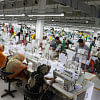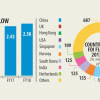Why so many problems with FDI?

Bangladesh has mostly failed to achieve its targeted level of foreign direct investments (FDIs), with investment inflow amounting to only 0.75 percent of GDP in 2023, according to UNCTAD. Efforts to attract foreign investors by developing economic zones and adopting one-stop services have not yielded much results, raising the question: what's the country doing wrong? A recent report by the US administration has identified precisely what's holding the country back -- corruption, bureaucracy, an anti-competitive procurement system, violation of intellectual property rights, unreliable logistics, and lack of skilled labour, among others.
The United States Trade Representative (USTR) in its 2024 National Trade Estimate Report on Foreign Trade Barriers showed corruption to be deeply ingrained in Bangladesh's commercial environment. This is partly laxity in enforcement of relevant legislative measures. US investors have voiced concerns over the undue delays and bureaucratic hurdles they face.
Efforts to undermine the independence of the Anti-Corruption Commission (ACC) through legislation such as the Sarkari Chakori Ain Bill—which limits its ability to investigate corruption allegations against government officials effectively—only accentuate the problem. Adding to that is the backlog of unresolved corruption cases and systematic attempts to dilute anti-government safeguards in procurement processes. The Daily Star reported a backlog of 3,300 cases in 2024 alone. Adding to the burden, the conviction rate hit a record low of 47% in the same year.
Despite building the central procurement and technical unit (CPTU) and then the Public Procurement Company, the US report also highlights the lack of transparency and fairness in public procurement. It also points out deficiencies in our legislative and rulemaking processes, particularly concerning patent law, copyright amendments, and the enactment of the Industrial Design Act. Meanwhile, the proposed Personal Data Protection Act and regulations for digital, social media, and the top platforms pose potential threats to privacy and freedom of expression, raising apprehensions among the international investment community.
Another significant hurdle is the country's infrastructure deficit and logistical inefficiencies. While the country has made strides in power generation and connectivity, gaps in transport networks, port congestion, and inconsistent energy supply remain persistent challenges. The World Bank's Ease of Doing Business Index previously highlighted delays in land acquisition, customs clearance, and business registration as major obstacles. Foreign investors often cite the high logistics cost and unreliable utility services as deterrents. Without improving these fundamentals, the country will struggle to compete with regional peers like Vietnam and India in attracting high-value foreign investments.
Beyond infrastructure, Bangladesh must focus on building a skilled workforce to attract knowledge-intensive FDI. While the country enjoys a large, young labour pool, gaps in technical expertise and vocational training hinder its competitiveness in IT, manufacturing, and R&D. According to the World Economic Forum, automation and AI are reshaping global industries, making skill development more critical than ever. To stay ahead, Bangladesh must invest in STEM education, industry-driven training programmes, and stronger university-industry collaboration.
These challenges need to be taken seriously by our policymakers, as cosmetic incentives to foreign investors can only work for a limited time. For Bangladesh to unlock its full economic potential and foster a conducive environment for foreign investment and sustainable growth, it must address the longstanding problems discouraging investors. This will require a concerted effort from the government, but first, there must be the political will to tackle entrenched corruption and bureaucratic inefficiencies. Meanwhile, the government needs to make serious improvements to the country's Intellectual Property (IP) regime, ensuring better coordination among enforcement authorities and government institutions and moving away from repressive regulatory frameworks for data protection and online content regulation.
The author is the chairman of Financial Excellence Limited.

 For all latest news, follow The Daily Star's Google News channel.
For all latest news, follow The Daily Star's Google News channel. 








Comments